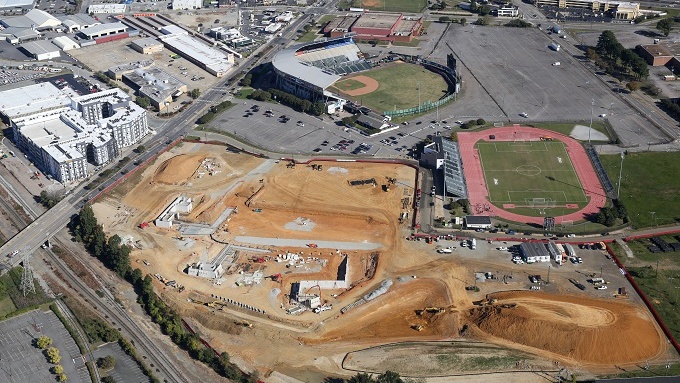
Construction is underway on CarMax Park, which will replace the adjacent, nearly 40-year-old Diamond. (Skyshots Photography)
Editor’s note: This is Part 2 of a two-part series. Part 1 can be read here.
‘A powder keg with a lot of moving parts’
In the days following the city’s communication terminating their negotiations on the Diamond District, an attorney for development team RVA Diamond Partners asked the city’s outside legal counsel if a deal could be salvaged, if the team was able to work out “an acceptable solution.”
Republic Properties, which had formed the team but refused to sign the development agreement approved by City Council, had told teammates Loop Capital and Thalhimer Realty Partners that it was bowing out of the project they had won over 14 other contender teams.
But George Keith Martin, an attorney with McGuireWoods who was representing the team, sought clarification on the fate of the project.
“Does this mean that the City is terminating the award? Is the City willing to work with the RVADP team if they are able to work out an acceptable solution shortly,” Martin asked in an email to John O’Neill, a Hunton Andrews Kurth attorney representing the city.
O’Neill replied that if the team had solutions it wanted to propose, it should do so “without delay.”
“But,” O’Neill added, “RVADP should understand that the City is evaluating alternatives to achieving the Diamond District project. It will not suspend this evaluation waiting for any solution RVADP wishes to offer and will pursue the approach that is in the best interest of the City.”
With Republic off the project, and with no formal agreement with RVA Diamond Partners, the city had started weighing how to move the project forward. The city continued to work with Thalhimer and Loop, with Thalhimer’s Jason Guillot running point in discussions with the Flying Squirrels ballclub.
At the same time, Squirrels leadership had been informally working with David Carlock, who’d begun advising the Squirrels in design negotiations. Carlock’s Machete Group, the Houston-based venue advisory and development management firm, would later officially become the Squirrels’ stadium consultant, replacing JMI Sports in an arrangement that also saw architecture firm Odell (now LaBella Associates) take over the design work from DLR Group.
Development duties for the overall Diamond District project were ultimately divvied up, with the Squirrels and Machete taking the lead on the ballpark, and Thalhimer and Loop responsible for the rest of the private development in the mixed-use project that’s to also include residential and commercial buildings.
But before that arrangement was formalized, tension between the parties continued to build, emails show.
In late June of last year, weeks after his reported call with Squirrels President Lou DiBella, Guillot declined a request from Carlock and Larry Botel, a Squirrels co-owner, for a look at the stadium’s soft costs budget – the amount of money set aside for non-construction expenses.
“I’ve spoken to the City and we prefer to manage the soft cost budget between the City/Developer at this stage,” Guillot told them in an email.
“The City has been very intentional about setting a not-to-exceed $90,000,000 budget for the hard costs associated with the ballpark and has agreed to an open-book, transparent process whereby they are allowing the team to take the lead on the vast majority of the design decisions despite 100% of the capital costs for the development being funded by the City.
“This is a very fair structure for all parties involved and ensures that the team has ‘ownership’ over the design and while not having any responsibility for the cost of construction as a tenant. The $90,000,000 hard cost budget will not be impacted by any soft costs,” Guillot wrote, adding that “it is our responsibility to ensure that all applicable soft costs are covered by the budget, and if not, for the (City)/Developer to be responsible for any overage.”
Carlock countered that “it’s important that we understand at minimum (1) how the city is allocating project costs and (2) that we know where costs are being carried.” He added: “Please let us know when you will have a soft cost budget available for review,” to which Guillot replied: “We are not sharing the soft cost budget at this time.”
Guillot’s stance prompted a strong response from Botel, the Squirrels co-owner, who pleaded that they all be on the same team.
“(Carlock) and I cannot be the only people on this entire deal trying to move it forward. We need your help,” Botel told Guillot. “You above everyone else on the city and developer side know that the only way this is going to get done is with full cooperation and give and take from all sides of the transaction. (It’s) real estate development 101.”
Contending that Guillot’s statements about a transparent process and the city funding all capital costs while the Squirrels had no responsibility for construction costs as a tenant “are just not true,” Botel said: “This is a $110mm project and (it’s) not open book on $20mm of it.”
Adding that he and Carlock had developed a good rapport with Lincoln Saunders, the city’s chief administrative officer, and that Saunders had been open to many requests they had made, Botel told Guillot, “we are looking to you to do the same.”
“As you know this is a powder keg with a lot of moving parts. We are trying to do everything we can to get to the finish line but (can’t) do that without everyone’s cooperation. We feel like the city is there as best they can be but we need you to be as well. It will only benefit the overall transaction and give it the best chance of getting done.
“This involves not only providing information but also making sure the city is doing everything it can to push the process forward. We are still greatly concerned that DLR and the predevelopment process is underfunded. The fact that we don’t know the water table and soil conditions at this point is troubling to say the least,” Botel said.
“The next 30 days are critical. The schedule allows for no give to get us to opening day 2026. Any pressure you can put on the city to keep things moving, including pressure on them to fund costs, is needed,” Botel said. “Any reasonable information we ask for which will help us get comfortable with signing a lease will help greatly. We need you and Thalhimer to be with us on this.”
‘Walking a fine line’
In his earlier emails with Jonathan Fine, the city’s sports industry advisor, Guillot described working with both the city and the Squirrels as a delicate balancing act.
“I always felt like I was walking a fine line because the City did not want me talking to the team without them present on every call, but it wasn’t always practical to make sure everyone was on every call and email, especially those that were impromptu,” Guillot told Fine.
“My goal since the project award in September was to develop a relationship and trust with the team, while acknowledging the process that the City outlined and wanted to manage,” he said. “At times I felt like I was threading the needle to manage relationships with both the City and the Squirrels, but my goal was to try and show progress on design and programming while knowing that we were limited in continuing to spend design fees before having a contract with the City.”
As work continued through 2023, Thalhimer and Loop sought to see through their part of the project with another partner to replace Republic. At one point they engaged Lincoln Property Co., a Dallas-based developer that by then was vying for Richmond’s City Center project to replace the downtown Coliseum.
Lincoln Property ultimately did not sign on, and Thalhimer and Loop changed course and reached out to Richmond investors to raise millions of dollars in additional capital needed to move forward with the project without Republic’s investment.
Around the same time, Machete Group had engaged Peterson Cos., a Northern Virginia development firm, about potentially getting involved in the project – an option that was given consideration by the city.
But by this past spring, the city opted to stick with Thalhimer and Loop, and worked out a new deal with Diamond District Partners, the new development team entity that did not include Republic. The deal changed the scope of the project to a 30-acre first phase that Diamond District Partners is signed on to develop, with the rest of the 67-acre site, minus the stadium, to be sold and developed in subsequent phases.
The deal also changed the project’s financing approach, with the city taking on the debt obligation for $170 million in bonds for the ballpark and first-phase infrastructure improvements. Tax revenue from the ballpark and initial development is to be used to pay off the bonds.
Unknown at the time, but soon after the new development deal was OK’d by City Council in May, Loop began to back away from the project, ultimately bowing out as an investor and leaving Thalhimer to lead the team solo.
Two months later, Republic hit Thalhimer and Loop with its $40 million lawsuit, alleging that they breached a venture partnership with Republic when they formed the new entity and entered the new agreement with the city. Thalhimer is fighting the lawsuit, which its CEO has called “baseless,” while Loop contends that it never signed on to either team iteration and should be dropped from the suit.
According to the lawsuit, Thalhimer and Loop proposed buying out Republic’s 40% interest in the venture, and Republic said it would consider a buyout offer. But when they made an offer this past April, the suit states, Thalhimer and Loop “then indicated that they did not have the resources to close on the purchase.”
It was then that Republic’s Jordan Kramer emailed Lincoln Saunders, the city CAO, requesting to discuss a settlement. The email was sent May 5 – three days before City Council’s vote to approve the new agreement.
Home stretch
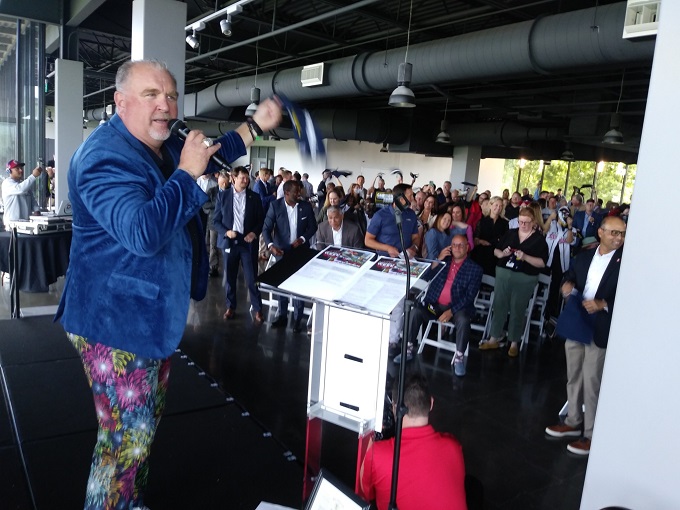
Todd ‘Parney’ Parnell, now a senior advisor with the Flying Squirrels, livens up the crowd at the CarMax Park name announcement in September.
While the lawsuit looms over the larger Diamond District development, which Diamond District Partners is aiming to start next fall, work on CarMax Park is now underway, following approvals of lease and development agreements between the city and the Squirrels.
Under the agreements, the ballclub is to pay $3.2 million in annual rent to the city EDA for each of the first 10 years of a 30-year lease, with lower rents in subsequent years. The overall rent payment over the 30-year lease totals $66 million – among the highest leases in Minor League Baseball, DiBella has said.
The rent commitments were part of a deal worked out between the Squirrels and the city, in which the ballclub agreed to cover any cost overages above the stadium budget. DiBella has said the arrangement was possible only with CarMax’s financial commitment for the ballpark’s naming rights. Terms of that deal have not been disclosed.
At the naming rights announcement and a groundbreaking ceremony for CarMax Park this September, those involved in getting the project to that point acknowledged the rocky road they’d taken to get there.
Addressing CAO Saunders and Mayor Levar Stoney at the naming announcement, DiBella said: “It was hard getting here, not without pain and suffering. And you guys got MF’d enough by me,” prompting laughs from the crowd.
“Lincoln and I, it was so tense with us for so long. But I’ve got to tell you something, I never doubted his commitment to wanting us to get here in a deal that he could feel proud presenting to the citizens of Richmond,” he said.
Addressing Saunders and other officials at the groundbreaking days later, DiBella added: “There were times I didn’t think you knew what the hell was going on or what we were doing. But I’ve got to tell you the truth, I never doubted your commitment to getting it done.”
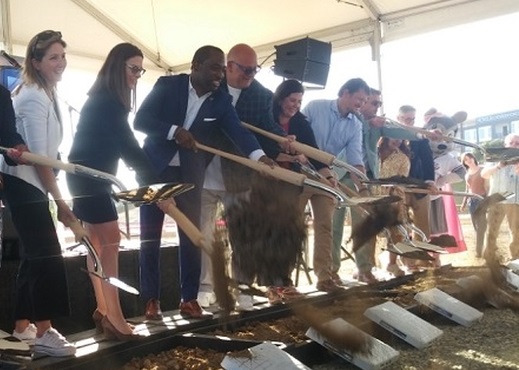
Taking part in the groundbreaking were City Councilmember Katherine Jordan, left, and starting third from left: Mayor Levar Stoney, Lou DiBella, Council President Kristen Nye and CAO Lincoln Saunders.
Stoney and City Council members also acknowledged tough talk and disagreements along the way, but reiterated that they all worked together to get the new ballpark across home plate.
“It took teamwork, even when it felt like we weren’t all on the same team,” Councilmember Katherine Jordan said at the groundbreaking. “And sometimes we weren’t. But we all had the same goal: keep baseball in Richmond, keep baseball on the boulevard, keep the Squirrels here and give them the stadium they deserve.”

Construction is underway on CarMax Park, which will replace the adjacent, nearly 40-year-old Diamond. (Skyshots Photography)
Editor’s note: This is Part 2 of a two-part series. Part 1 can be read here.
‘A powder keg with a lot of moving parts’
In the days following the city’s communication terminating their negotiations on the Diamond District, an attorney for development team RVA Diamond Partners asked the city’s outside legal counsel if a deal could be salvaged, if the team was able to work out “an acceptable solution.”
Republic Properties, which had formed the team but refused to sign the development agreement approved by City Council, had told teammates Loop Capital and Thalhimer Realty Partners that it was bowing out of the project they had won over 14 other contender teams.
But George Keith Martin, an attorney with McGuireWoods who was representing the team, sought clarification on the fate of the project.
“Does this mean that the City is terminating the award? Is the City willing to work with the RVADP team if they are able to work out an acceptable solution shortly,” Martin asked in an email to John O’Neill, a Hunton Andrews Kurth attorney representing the city.
O’Neill replied that if the team had solutions it wanted to propose, it should do so “without delay.”
“But,” O’Neill added, “RVADP should understand that the City is evaluating alternatives to achieving the Diamond District project. It will not suspend this evaluation waiting for any solution RVADP wishes to offer and will pursue the approach that is in the best interest of the City.”
With Republic off the project, and with no formal agreement with RVA Diamond Partners, the city had started weighing how to move the project forward. The city continued to work with Thalhimer and Loop, with Thalhimer’s Jason Guillot running point in discussions with the Flying Squirrels ballclub.
At the same time, Squirrels leadership had been informally working with David Carlock, who’d begun advising the Squirrels in design negotiations. Carlock’s Machete Group, the Houston-based venue advisory and development management firm, would later officially become the Squirrels’ stadium consultant, replacing JMI Sports in an arrangement that also saw architecture firm Odell (now LaBella Associates) take over the design work from DLR Group.
Development duties for the overall Diamond District project were ultimately divvied up, with the Squirrels and Machete taking the lead on the ballpark, and Thalhimer and Loop responsible for the rest of the private development in the mixed-use project that’s to also include residential and commercial buildings.
But before that arrangement was formalized, tension between the parties continued to build, emails show.
In late June of last year, weeks after his reported call with Squirrels President Lou DiBella, Guillot declined a request from Carlock and Larry Botel, a Squirrels co-owner, for a look at the stadium’s soft costs budget – the amount of money set aside for non-construction expenses.
“I’ve spoken to the City and we prefer to manage the soft cost budget between the City/Developer at this stage,” Guillot told them in an email.
“The City has been very intentional about setting a not-to-exceed $90,000,000 budget for the hard costs associated with the ballpark and has agreed to an open-book, transparent process whereby they are allowing the team to take the lead on the vast majority of the design decisions despite 100% of the capital costs for the development being funded by the City.
“This is a very fair structure for all parties involved and ensures that the team has ‘ownership’ over the design and while not having any responsibility for the cost of construction as a tenant. The $90,000,000 hard cost budget will not be impacted by any soft costs,” Guillot wrote, adding that “it is our responsibility to ensure that all applicable soft costs are covered by the budget, and if not, for the (City)/Developer to be responsible for any overage.”
Carlock countered that “it’s important that we understand at minimum (1) how the city is allocating project costs and (2) that we know where costs are being carried.” He added: “Please let us know when you will have a soft cost budget available for review,” to which Guillot replied: “We are not sharing the soft cost budget at this time.”
Guillot’s stance prompted a strong response from Botel, the Squirrels co-owner, who pleaded that they all be on the same team.
“(Carlock) and I cannot be the only people on this entire deal trying to move it forward. We need your help,” Botel told Guillot. “You above everyone else on the city and developer side know that the only way this is going to get done is with full cooperation and give and take from all sides of the transaction. (It’s) real estate development 101.”
Contending that Guillot’s statements about a transparent process and the city funding all capital costs while the Squirrels had no responsibility for construction costs as a tenant “are just not true,” Botel said: “This is a $110mm project and (it’s) not open book on $20mm of it.”
Adding that he and Carlock had developed a good rapport with Lincoln Saunders, the city’s chief administrative officer, and that Saunders had been open to many requests they had made, Botel told Guillot, “we are looking to you to do the same.”
“As you know this is a powder keg with a lot of moving parts. We are trying to do everything we can to get to the finish line but (can’t) do that without everyone’s cooperation. We feel like the city is there as best they can be but we need you to be as well. It will only benefit the overall transaction and give it the best chance of getting done.
“This involves not only providing information but also making sure the city is doing everything it can to push the process forward. We are still greatly concerned that DLR and the predevelopment process is underfunded. The fact that we don’t know the water table and soil conditions at this point is troubling to say the least,” Botel said.
“The next 30 days are critical. The schedule allows for no give to get us to opening day 2026. Any pressure you can put on the city to keep things moving, including pressure on them to fund costs, is needed,” Botel said. “Any reasonable information we ask for which will help us get comfortable with signing a lease will help greatly. We need you and Thalhimer to be with us on this.”
‘Walking a fine line’
In his earlier emails with Jonathan Fine, the city’s sports industry advisor, Guillot described working with both the city and the Squirrels as a delicate balancing act.
“I always felt like I was walking a fine line because the City did not want me talking to the team without them present on every call, but it wasn’t always practical to make sure everyone was on every call and email, especially those that were impromptu,” Guillot told Fine.
“My goal since the project award in September was to develop a relationship and trust with the team, while acknowledging the process that the City outlined and wanted to manage,” he said. “At times I felt like I was threading the needle to manage relationships with both the City and the Squirrels, but my goal was to try and show progress on design and programming while knowing that we were limited in continuing to spend design fees before having a contract with the City.”
As work continued through 2023, Thalhimer and Loop sought to see through their part of the project with another partner to replace Republic. At one point they engaged Lincoln Property Co., a Dallas-based developer that by then was vying for Richmond’s City Center project to replace the downtown Coliseum.
Lincoln Property ultimately did not sign on, and Thalhimer and Loop changed course and reached out to Richmond investors to raise millions of dollars in additional capital needed to move forward with the project without Republic’s investment.
Around the same time, Machete Group had engaged Peterson Cos., a Northern Virginia development firm, about potentially getting involved in the project – an option that was given consideration by the city.
But by this past spring, the city opted to stick with Thalhimer and Loop, and worked out a new deal with Diamond District Partners, the new development team entity that did not include Republic. The deal changed the scope of the project to a 30-acre first phase that Diamond District Partners is signed on to develop, with the rest of the 67-acre site, minus the stadium, to be sold and developed in subsequent phases.
The deal also changed the project’s financing approach, with the city taking on the debt obligation for $170 million in bonds for the ballpark and first-phase infrastructure improvements. Tax revenue from the ballpark and initial development is to be used to pay off the bonds.
Unknown at the time, but soon after the new development deal was OK’d by City Council in May, Loop began to back away from the project, ultimately bowing out as an investor and leaving Thalhimer to lead the team solo.
Two months later, Republic hit Thalhimer and Loop with its $40 million lawsuit, alleging that they breached a venture partnership with Republic when they formed the new entity and entered the new agreement with the city. Thalhimer is fighting the lawsuit, which its CEO has called “baseless,” while Loop contends that it never signed on to either team iteration and should be dropped from the suit.
According to the lawsuit, Thalhimer and Loop proposed buying out Republic’s 40% interest in the venture, and Republic said it would consider a buyout offer. But when they made an offer this past April, the suit states, Thalhimer and Loop “then indicated that they did not have the resources to close on the purchase.”
It was then that Republic’s Jordan Kramer emailed Lincoln Saunders, the city CAO, requesting to discuss a settlement. The email was sent May 5 – three days before City Council’s vote to approve the new agreement.
Home stretch

Todd ‘Parney’ Parnell, now a senior advisor with the Flying Squirrels, livens up the crowd at the CarMax Park name announcement in September.
While the lawsuit looms over the larger Diamond District development, which Diamond District Partners is aiming to start next fall, work on CarMax Park is now underway, following approvals of lease and development agreements between the city and the Squirrels.
Under the agreements, the ballclub is to pay $3.2 million in annual rent to the city EDA for each of the first 10 years of a 30-year lease, with lower rents in subsequent years. The overall rent payment over the 30-year lease totals $66 million – among the highest leases in Minor League Baseball, DiBella has said.
The rent commitments were part of a deal worked out between the Squirrels and the city, in which the ballclub agreed to cover any cost overages above the stadium budget. DiBella has said the arrangement was possible only with CarMax’s financial commitment for the ballpark’s naming rights. Terms of that deal have not been disclosed.
At the naming rights announcement and a groundbreaking ceremony for CarMax Park this September, those involved in getting the project to that point acknowledged the rocky road they’d taken to get there.
Addressing CAO Saunders and Mayor Levar Stoney at the naming announcement, DiBella said: “It was hard getting here, not without pain and suffering. And you guys got MF’d enough by me,” prompting laughs from the crowd.
“Lincoln and I, it was so tense with us for so long. But I’ve got to tell you something, I never doubted his commitment to wanting us to get here in a deal that he could feel proud presenting to the citizens of Richmond,” he said.
Addressing Saunders and other officials at the groundbreaking days later, DiBella added: “There were times I didn’t think you knew what the hell was going on or what we were doing. But I’ve got to tell you the truth, I never doubted your commitment to getting it done.”

Taking part in the groundbreaking were City Councilmember Katherine Jordan, left, and starting third from left: Mayor Levar Stoney, Lou DiBella, Council President Kristen Nye and CAO Lincoln Saunders.
Stoney and City Council members also acknowledged tough talk and disagreements along the way, but reiterated that they all worked together to get the new ballpark across home plate.
“It took teamwork, even when it felt like we weren’t all on the same team,” Councilmember Katherine Jordan said at the groundbreaking. “And sometimes we weren’t. But we all had the same goal: keep baseball in Richmond, keep baseball on the boulevard, keep the Squirrels here and give them the stadium they deserve.”

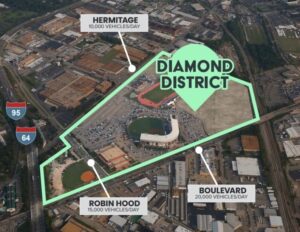
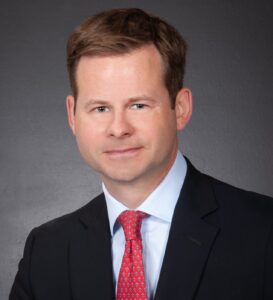

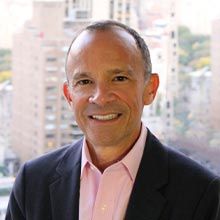

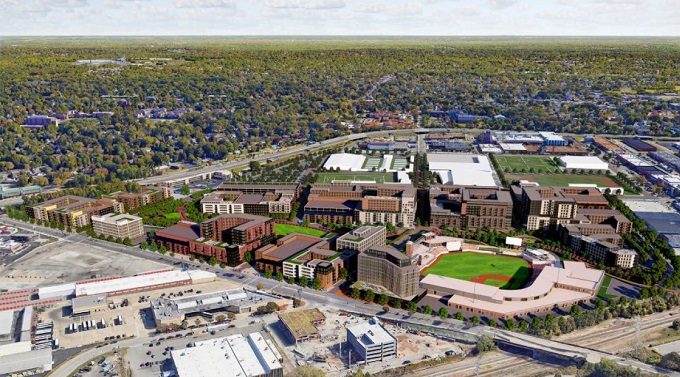
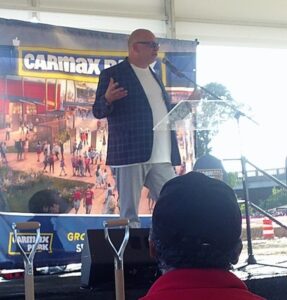


Should have been downtown.
I like stories that end with, “And they all lived happily ever after.” I have a feeling this is not one of those stories.
Sounds like a minor miracle this thing ever got off the ground. Looking forward to the new stadium and glad the Squirrels will be here for the foreseeable future. Republic appears to be the perfect company for the times; win the bid, back out because you don’t like the way things are going, then get a share of the pie you rejected by suing your ex-partners. Reminds one of a certain New York City real estate developer and his bully-boy grift.
Who’s the bully-boy?
So Thalhimer chased both of their business partners away after winning the deal. Getting sued by one of them, and the other doesn’t want to be associated with at all. Only developing a third of what they originally said they would do.
Was Lou DiBella a Protagonist or Antagonist in this story. He certainly sounds unlikeable. Cussing everyone out until he got what he wanted, then says “I knew you could do it”… LOL!
Good story Jonathan. I really think Thalhimer needs a bit more scrutiny. Just too many questions around them.
Lou DiBella comes from the boxing world. I think that is his normal demeanor.
Maybe the guys from out of town thought they were going to bulldoze Thalheimer, but he wouldn’t roll over…
The articles are great insight but the deal is done?? To give you a baseball analogy the City has stepped up to the plate and hit the ball but until the stadium (is complete and does not have major repairs year 1) and surrounding area (see some kind of actually development and not a promise it will start sometime next year) are built out with revenues coming in, we are not sure if this is ground ball, single, double, triple or home run!
probably a ground out into a double play…
Great quote to sum it all up. Kudos to Jonathan Spiers and Katherine Jordan for bringing this “home”!
If the original development partnership that got selected wasn’t what actually came together as “pitched”, why didn’t the city begin negotiating with the second best proposal of the 14 that were evaluated?
I’m surprised that one or more of those entities hasn’t initiated a lawsuit. I’m sure putting together their package of proposals was costly and could understand them wanting compensation based on the current fiasco. Perhaps they can sell their renderings to the soon-to-open Richmond Museum of Projects That Never Happened.